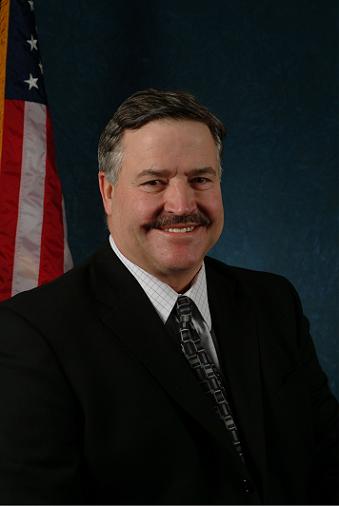Sustainable agriculture advocates worry about the appointment of Board of Regents leaders

Iowa Board of Regents President Craig Lang
July 20, 2011
With the appointments of Craig Lang as the Iowa Board of Regents president and Bruce Rastetter as the board’s president pro tem, sustainability agriculture advocates have begun to worry about the board’s influence on agriculture at Iowa State.
“We are already going in a direction that the university should not be going,” said Erwin Klaas, professor of animal ecology. “If the Board of Regents and its new leaders take over and influence the university, it will negatively affect sustainable agriculture.”
Regents Lang and Rastetter were elected to their current positions in a telephonic meeting July 12. They were appointed after the previous board President David Miles and the previous president pro tem Jack Evans resigned their positions July 11.
In addition to holding his position on the board, Lang serves as the president of the Iowa Farm Bureau Federation. Rastetter is the chief executive at Hawkeye Energy Holdings.
“My gut feeling is that the farm bureau is a large organization that’s already putting too much pressure on the university for hiring and firing people,” Klaas said. “To appoint the president of the farm bureau as the Board of Regents president is not appropriate.”
In his resignation letter to the board, Miles wrote that Gov. Terry Branstad had approached both him and Miles, and asked them to resign from their positions. Many critics questioned whether Branstad overstepped the bounds of his authority as governor when he asked the two regents to resign.
Questions of authority were raised again after Lang and Rastetter were elected to replace Miles and Evans.
According to the National Institute on Money in State Politics, Lang donated $500 to Branstad’s 2010 campaign. The Iowa Farm Bureau Federation, of which Lang is president, contributed $53,000 to Branstad’s campaign, making it the third-largest donation from an organization.
Furthermore, Rastetter was the largest individual contributor to Branstad’s campaign, the Iowa State Daily reported Feb. 27, 2011. He donated $162,000 to Branstad.
Klaas said he believes Branstad’s influence in the resignation and later appointment of leaders on the Board of Regents is “inappropriate.”
“I believe that the less political influence we have on the direction of the university, the better,” he said.
Sustainable agriculture advocates are especially worried about the future of the Leopold Center of Sustainable Agriculture at Iowa State. The Leopold Center is a research and education center that focuses on statewide programs to develop sustainable agricultural practices.
The center was established under the Groundwater Protection Act of 1987. According to its website, the center a has a threefold mission: to conduct research about the negative impacts of agricultural practices, to assist in developing alternative practices and to work with ISU Extension to inform the public of Leopold Center findings.
“The Leopold Center funds sustainable agriculture projects,” Interim Leopold Center Director Mark Honeyman said.”The center receives funds from the tax on fertilizers, to help Iowa have more sustainable agriculture.”
Klaas is concerned that the Board of Regents, which he worries may be influenced by Branstand, will exert undue political influence on the Leopold Center.
“The board could exert influence on what center focuses on,” he said. “The direction the Leopold Center goes in should be science-based, not be influenced by politics.”
Some critics also worry that the board will choose an ISU president that will not support sustainable agriculture and the Leopold Center. Since the Leopold Center was created by state law, the center cannot be closed. However, Klaas is concerned that the board members will make decisions based on the pursuit of corporate interests.
“As a land-grant institution, the mission is to serve the people,” he said. “Whenever large corporations can influence the university’s direction, that’s not in the best interest of the people. You’ve got to think about the whole community.”
John Olthoff, professor at Dordt college and member of the Leopold Center advisory board, said that he is not worried about the next ISU president hindering the work of the Leopold Center.
“I have high hopes that the next president will be supportive of agriculture and the Leopold Center,” he said.
Honeyman also said that the Leopold Center will continue to thrive regardless of who the ISU president is.
“The Leopold Center is very well-respected nationally, and I’m sure whoever is leading the university will realize that,” he said. “I suspect that the Leopold Center will continue to have administrative support.”
Dean of the College of Agriculture and Life Sciences Wendy Wintersteen was not available for comment.
















